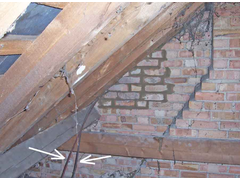
Electricity supply to a semi
907 - 20/8/15 at 06:36 AM
Hi All
I live in a rented semi detached.
The single phase comes from the pole to the corner of next door and splits into two.
One pair of wires runs down the outside of their wall and into their meter.
The other pair goes up through the woodwork and into their loft, dangles over the dividing loft fire wall,
then dangles down and across my loft floor and exits through the woodwork, (is it a soffet?) down the
outside of the house and then back in through the brickwork to my meter.
My question is, is this legal?
Should there be a separate supply from the pole to each house?
Is it safe to have unfused, un-tripped mains wires just laying across the loft floor?
Will I get a shock when I knock the copper nails through the wires?
Where's the best place to buy rubber gloves?
Thanks in anticipation
Paul G
r1_pete - 20/8/15 at 07:04 AM
Yes its legal, the regulations didn't exist when the house was built that do now, if you were to have it re-wired the cables across the loft
would need rectifying before it would pass, and probably the outside too, but there is nothing in the laws that says new regs need to be retro fitted
to older properties. Sale time for such properties is getting tougher though if these things haven't been updated.
Some of the old mining terraces near me are the same 6 or 8 houses in a row with the mains running along just under the soffit and a tail leading down
to each meter...
coyoteboy - 20/8/15 at 09:21 AM
I'm guessing it would be fused at the pole. However....
If it's a rented property, I believe you have to have a certificate of safety for renting commercially, which would include a safety check. That
said, it's probably an acceptable low-traffic location for it. You have gas pipes popping up straight to your boiler too, with no leak detection
and no shielding - knock a nail through that and you're in deep doo-doo too.
You can't take all of the risk out of everything, and when they try to it makes it a nightmare for anyone with common sense and basic skills to
do DIY work.
[Edited on 20/8/15 by coyoteboy]
Mikef - 20/8/15 at 09:27 AM
As you do not need to have an electrical test cert, as you do for gas. However you do have an obligation to ensure that all of the electrical wiring
is safe and fit for use. In my opinion the only way to ensure this is to have a fixed wiring test. Might be worth flagging up with your landlord.
slingshot2000 - 20/8/15 at 12:06 PM
A fixed wiring test does not include the DNO's supply. It is only concerned with the installation from the meter / cut-out onwards, usually
starting with the "meter tails".
907 - 20/8/15 at 12:31 PM
Thanks for all the replies chaps.
Many years ago when the paraffin well ran dry the new fangled lectrickery people knocked a hole in the loft wall
so they could crawl through dragging the wire behind them.
Since a change of neighbours I have reinstated the fire wall. Yup, I know. Don't give up the day job. 
The photo shows the cables hanging across the loft floor.
To me it just doesn't look right.
Cheers
Paul G


Description
r1_pete - 20/8/15 at 12:56 PM
Catweasel wouldn't want his Aunt Sally up there near those would he.....
As its in an unused part of the house, and if the insulation is good, it would seem safe, if you are worried about it, it would be quite easy to fit
some plastic trunking to that roof beam and sit the wires in there, the U shape trunking with the snap in lid would work, and you wouldn't need
tools when slotting the cables in, so no fear of damaging the insulation.
907 - 20/8/15 at 01:40 PM
quote:
Originally posted by r1_pete
Catweasel wouldn't want his Aunt Sally up there near those would he.....
As its in an unused part of the house, and if the insulation is good, it would seem safe, if you are worried about it, it would be quite easy to fit
some plastic trunking to that roof beam and sit the wires in there, the U shape trunking with the snap in lid would work, and you wouldn't need
tools when slotting the cables in, so no fear of damaging the insulation.
That's a good idea Pete.
I'll send the wife up to fit it.
DIY Si - 21/8/15 at 06:42 PM
I'd give your local DNO a ring, as whilst the location is perfectly fine, they should be clipped/secured every so far along the cable. I'm
not sure what the distances are, but I think every 2'/600mm rings a bell, but it does vary depending upon the type of cable and it's
location.
It does seem an odd way of doing it, as the standard approach is to run the cables along under the eaves. The house I'm in now has the big bundle
of wires come up one corner and then feeds the next 8-10 houses along the row, with them being fed in dropped pairs. One house then feeds into the
next for the main supply prior to the meter.



